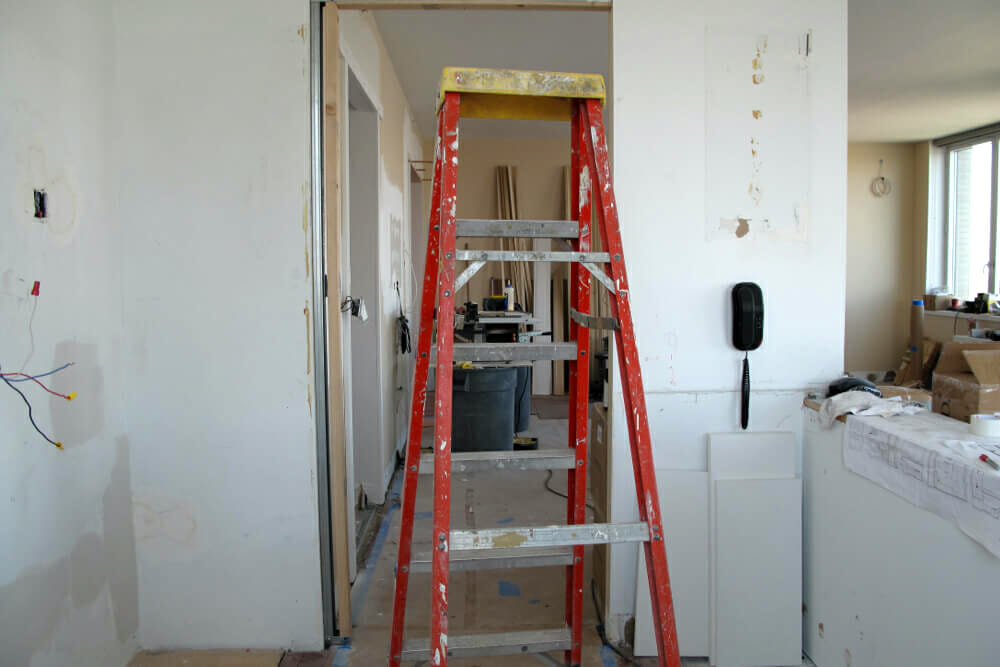The Cons of DIY in Home Renovations
Doing a home renovation yourself is tempting. Here, Sweeten lays out the cons of a DIY renovation.

Fueled by enough YouTube videos, a homeowner can feel emboldened to take on anything—even a DIY renovation.
It’s natural to be undecided about whether you want to do that full home renovation by yourself or hire professionals. Doing it yourself can mean acting as your own project manager, or it can mean doing it all by hand (completely or partially.) In any case, the prospect of cost savings is what tempts most renovators.
However, there is a counter-argument—the cons of DIY. Is that DIY full home renovation really in your best interests? Examining the cons of DIY isn’t a scare story or a money pit narrative. Instead, it’s a window onto the scale and complexity of DIY house renovation. Below, Sweeten outlines how to make an informed decision.
Sweeten matches home renovation projects with vetted general contractors, offering advice, support, and secure payments—for free.
Cons of DIY: Completion time
Home renovations require time and attention to make both small and key decisions. Depending on the scope, part of your home may be covered in plastic protection, or kitchens and bathrooms will be unusable. What you want is a full home renovation that operates on a compact, predictable schedule.
You have a life. Career, kids, relationships, friends, leisure: All of these have priority. This narrows down the amount of time that you have available to work on your house.
Professionals compress the schedule and complete the project much faster than if you had done it by yourself. Both parties should discuss the schedule and duration so everyone has a clear understanding and realistic expectations. Plus, they have a vested interest in finishing in an efficient manner since yours is likely one of many projects they’re completing.
Keeping on schedule
When you install your own laminate floor or paint your own bathroom, timing is easy. You have three or four minor milestones to hit, and it’s simple to keep them in order.
But when the project is as multi-layered as a full home renovation, it’s like playing multi-dimensional chess. Each project—floor, walls, windows, plumbing, and more—has its own set of milestones. Each of those projects is a milestone and must weave in with other projects. And, to make it even more interesting, you sometimes need to bounce back and forth between projects. Coordinating subcontractors within that system can get bewildering.
By contrast, contractors know how to keep scheduling straight; it’s their stock in trade. They’ll keep all of the projects running as consistently as possible. And they’ll seamlessly coordinate the movements of the subcontractors. Sweeten brings homeowners an exceptional renovation experience by personally matching trusted general contractors to your project, while offering expert guidance and support—at no cost to you. Renovate to live, Sweeten to thrive!
Cons of DIY: Quality of work
Unless you have tiled a shower before, you first need to learn how to tile a shower. The worst classroom for learning how to tile is in your own house. You do not want your house to be a test subject for your beginner tiling, wiring, flooring, or plumbing skills.
Professionals do this work all the time. With training, apprenticeships, and experience in the field, they have already worked out the kinks. Professionals generally turn out professional quality work.
Codes and permits
A vast amount of home renovation work touches on building codes and permits. Structural work, electrical, plumbing, HVAC, and even water heaters require permits in most municipalities. All permit work must be done according to code. And just because you aren’t required to pull a permit for a certain project doesn’t mean that building code isn’t applicable.
Code-compliant work may suffer at the hands of DIYers. The pros know code and are professionally bound to turn out work that complies with the latest codes. Contractors, subcontractors, designers, and architects stay abreast of the latest changes in their field.
Cons of DIY: Finding subcontractors
Subcontractors are skilled tradespeople who do projects like plumbing, electrical, drywall, painting, or flooring.
Even if you’ve decided to DIY your home renovation by hand, you still might end up hiring pros for some projects like whole-house wiring, solid wood or engineered wood floor installation, drywall installation, tiling a shower, or blowing or rolling insulation into an attic.
Finding and lining up good subcontractors can be a challenge. Using a contractor can take that chore off of your plate since the contractor has ready access to a pool of trusted subs.
Renovating safely
Homeowners taking on full DIY home renovations risk injury in many ways. Old paint might be lead-based, or those floor tiles might have asbestos. Black mold is common in ceilings, attics, and walls. Falls—the most common type of household injury—can occur even when you are on a ladder painting crown molding.
When you hire professionals to do the job, they have the know-how, safety gear, and materials to keep themselves and you safe. Safety is second nature to them since their livelihood and health depend on it.
Do DIY renovations really save money?
One reason often mentioned for doing a DIY full home renovation is that it saves money. As long as you can keep the renovation moving and on-target, with no wasted time or materials, you just might save some money.
But there is also the distinct possibility that you may lose this bet. If your project isn’t clearing inspections, you need to do it over until you get it right. That costs money. If you decide to do a hands-on renovation, you may need to purchase tools that are used only once: a wet tile saw, a full set of drywall tools, a paint sprayer.
When you hire a professional to do your full home renovation, you might save money in a number of ways. Savings might come in the form of wholesale discounts, bulk discounts, or special perks granted by a supplier since the professional is a regular buyer. Or from years of experience, the professional may have a keen eye for finding materials that are still high-quality but less expensive.
Is a DIY renovation the right choice?
No solution applies to everyone in all situations. A DIY home renovation might be perfect if you are hungry to learn new skills. For anyone who is interested in the process as well as the product, DIY renovation is an eye-opener. Finally, if you are short on money but long on time, a DIY renovation might be right for you.
Hiring professionals to do your whole-house renovation helps you hit those critical timing marks that keep you on schedule. The work will be done to professional quality, safely and cleanly, in accordance with local building codes. Peace of mind and the assurance that the job will be done right—and not hanging over your head for months—are just a few of the benefits of using pros to do your full house renovation.
When you’re ready to get started on your home remodel, work with Sweeten to renovate with the best contractors.
—
Sweeten handpicks the best general contractors to match each project’s location, budget, scope, and style. Follow the blog, Sweeten Stories, for renovation ideas and inspiration and when you’re ready to renovate, start your renovation with Sweeten.


